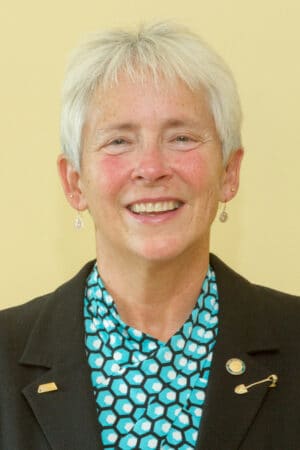
A devoted supporter of public health and environmental conservation, Pam Moss has held many gratifying positions in the water and wastewater field. Since childhood, she has loved science and always treasured any time outdoors. Pam also knew she wanted to teach in some capacity. When she pursued a master’s degree in the 1980s, she encountered a class that combined all of her passions—a microbiological course that focused on water and wastewater treatment. From there, she got a job as a water plant chemist at the Orange Water and Sewer Authority in Carrboro, North Carolina. “Everything fell in line for my love of science and the protection of the environment,” she reflects.
At OWASA, she gained a well-rounded appreciation for levels of operations beyond biology and chemistry. She got to train operators in the lab and, in turn, operators trained her on the mechanical aspects of the plant. This newfound knowledge excited Pam, so she started volunteering at different water associations by serving on boards and teaching for seminars and committees whenever she could. Pam also began advocating for operators’ access to continued education. Throughout the late 1990s and early 2000s, Pam worked with many groups. She partnered with the state, and she joined the North Carolina Operators’ Association as an Administrator. Pam also became the Executive Director for the then-named NC AWWA-WEA, where she helped facilitate yearly seminars and trainings in accordance with the new continuing education requirement for operators in North Carolina.
Wanting to get back into the scientific side of the field, Pam got a job at Hach Company in Colorado, where she served in several positions on the East Coast for sales, project management, and data management until 2020. She then moved up to Senior Technical Account Executive at Aquatic Informatics in British Columbia until her retirement in April 2022. However, Pam knew she wanted to stay involved with the industry. She also wanted that involvement to extend beyond North and South Carolina, so when AWWA asked her to be their liaison on the WPI board, she jumped at the opportunity. The NC AWWA-WEA lab committee had reached out to WPI for a wastewater certification program in the past, so Pam was already familiar with the organization’s mission. Now, she helps address the overhanging issue of national certification and assists operators who cross from one state/province to another. “I’m very happy to be working with WPI now,” she states, “where this group and their mission can have an impact on those frontline folks in the field.” Not only does she strengthen WPI’s relationship with AWWA—she also observes different backgrounds come together and offer new perspectives. “If you can bring people together, you can grow things,” she says.
During her career, Pam has been a part of many initiatives that show appreciation for utility professionals, whether they specialize in disaster relief or everyday operations. In the 1990s, she helped jump-start North Carolina’s own Lab Technology Day, which has gone on every year since then. Another prominent project she’s been involved with is North Carolina’s Collection & Distribution Schools, where industry workers come together three times a year to provide trainings. And even in retirement, Pam’s relationship with water and wastewater is far from over. In addition to her active memberships with WPI, AWWA, and WEF, Pam supports Water Mission in South Carolina, a nonprofit dedicated to ending the global water crisis. She also serves on the board for her local water utility, Bogue Banks Water Corporation. When she’s not working directly in the industry, she’s educating visitors on conservation and climate change at the North Carolina Aquariums as a volunteer.



